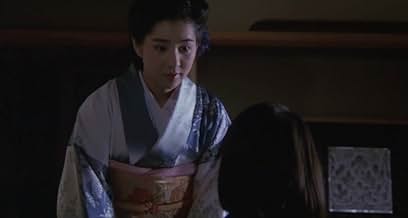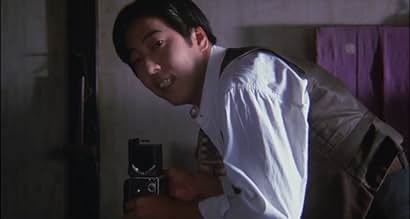AVALIAÇÃO DA IMDb
7,2/10
1,9 mil
SUA AVALIAÇÃO
Adicionar um enredo no seu idiomaThe orphaned Makioka sisters look for a husband for their third sister, Yukiko, as the rebellious youngest sister, Taeko, is kept waiting her turn.The orphaned Makioka sisters look for a husband for their third sister, Yukiko, as the rebellious youngest sister, Taeko, is kept waiting her turn.The orphaned Makioka sisters look for a husband for their third sister, Yukiko, as the rebellious youngest sister, Taeko, is kept waiting her turn.
- Direção
- Roteiristas
- Artistas
- Prêmios
- 5 vitórias e 9 indicações no total
Yonedanji Katsura
- Okuhata
- (as Kobeichô Katsura)
Michino Yokoyama
- Itani
- (as Michiyo Yokoyama)
Avaliações em destaque
We saw this beautiful movie several years ago at a Pacific Film Archive showing. We had read the book and found the film followed it faithfully and was gorgeously photographed. We just wish we knew if and when it will ever be made available on DVD or videotape. It was a pleasure to see a film that depicts life in nearly modern Japan with realistic people and locations. We have seen so many "studied" and arty films or medieval Japan that this one has remained a favorite ever since. We were pleased when a beautiful copy of "The Leopard" was released last year and hope that something this classic and beautiful can be made available to viewers.
I give this film 10 out of 10 as even after seeing it more than 10 times it still moves me deeply. I was 15 years old when I first saw this movie in the theater in Seattle. I went back to see it again a couple of weeks later. The first 13 minutes during the credits is my favorite scene, filmed in Kyoto in Springtime. Read the book for more background. The Kimono worn by the female actresses are amazing. The late Juzo Itami plays the father. All the dialog is spoken in "Osaka-ben" or Osaka dialect, which has a softer sound than Tokyo dialect. You can also hear some Kyoto-ben too ("gomen-yasu" said by a servant upon entering in the first scene before entering the room). This film brings me to tears it is so beautiful. At the end of the first scene, when the camera pans out to the cherry blossoms outside and the music starts...it is cinematic heaven! I am waiting for this film to come out on DVD.
The Makioka Sisters isn't really my kind of film, owing to it mostly being about matchmaking and set some decades ago (at least on the surface; there's a little more to chew on beyond the premise). That being said, I found enough to like here.
As the title might imply, the sisters really take charge here, and it was refreshing to watch a film like this set as far back as the late 1930s (to my knowledge, a very culturally conservative time in Japan's history) have female characters with agency who took charge. Mainly, it's the two older sisters of the four looking over the two younger sisters, given they've all been orphaned, with the two older siblings sometimes butting heads while doing what's right for the younger ones. They all feel like they have something of a say over where they're going in life (I guess the older siblings more so than the younger ones, but still), and that was good to see, and I imagine inspiring.
The acting is all solid. Male characters are put in the background, but aren't just there to be mocked or ridiculed. It feels like a feminist movie in a slightly more relaxed way than this premise might be done today, and I think I respect it for that. It's all nice and real and genuine, and doesn't call attention or show off regarding how much agency it's giving its female characters; it's not just doing it to get applause or grandstand.
The film also looks nice, which I think can be said about anything Kon Ichikawa directed. Unfortunately, it is a little long, at 140 minutes. Maybe about 110 minutes would've felt like the sweet spot for me, but trying runtime aside (it's a little boring in parts), I did mostly like The Makioka Sisters.
As the title might imply, the sisters really take charge here, and it was refreshing to watch a film like this set as far back as the late 1930s (to my knowledge, a very culturally conservative time in Japan's history) have female characters with agency who took charge. Mainly, it's the two older sisters of the four looking over the two younger sisters, given they've all been orphaned, with the two older siblings sometimes butting heads while doing what's right for the younger ones. They all feel like they have something of a say over where they're going in life (I guess the older siblings more so than the younger ones, but still), and that was good to see, and I imagine inspiring.
The acting is all solid. Male characters are put in the background, but aren't just there to be mocked or ridiculed. It feels like a feminist movie in a slightly more relaxed way than this premise might be done today, and I think I respect it for that. It's all nice and real and genuine, and doesn't call attention or show off regarding how much agency it's giving its female characters; it's not just doing it to get applause or grandstand.
The film also looks nice, which I think can be said about anything Kon Ichikawa directed. Unfortunately, it is a little long, at 140 minutes. Maybe about 110 minutes would've felt like the sweet spot for me, but trying runtime aside (it's a little boring in parts), I did mostly like The Makioka Sisters.
"Each sister is engaged in their own affairs, but Ichikawa's film (its Japanese title can be literally translated as "light snow") allots the lion's share to Sachiko and Yukiko, and the matchmaking arrangement preceded by precise calculation of all the conceivable conditions ("background" should be investigated through and through, no mentally disturbed mother-in-law lurking in the dark), the sheer canniness and the business-like action is astounding (death certificates of diseased wife and children are tossed over the dinner table), and Yukiko, played by beloved Japanese actress Yoshinaga with a comely reticence, extraordinarily wears down the mounting pressure and grinding process, to claim her hard-won victory, a good match is worth the wait, especially when eligible ones are few and far between during the wartime; whereas Sakuma, so adroitly embodies Sachiko's diligence and tenuous discomposure under a painstakingly maintained graciousness that comes naturally with age and savoir faire."
read my full review on my blog: cinema omnivore, thanks
read my full review on my blog: cinema omnivore, thanks
Not being in the mood for a Japanese take on "Masterpiece Theatre" I bailed about halfway through this Kon Icikawa offering. I notice several prior reviewers have compared this film to the works of Ozu. And while it is true that "Sisters" is a family drama, a genre Ozu all but invented in his country, it could not be more different in mood and feel. Where works such as "Late Spring" and "Tokyo Story" are contemplative, sad and often quite funny I found this film to be melodramatic, stiff and occasionally amusing. Perhaps the biggest difference between the two directors is in the pacing. Where Ozu's best films flow, slowly but inexorably, toward a powerful conclusion I found Ichikawa's pacing to be, well, let's use the "Masterpiece" analogy again. Too many indoor scenes that felt like skilled, dramatic readings from Tanizaki's great novel rather than a visual adaptation of it. Which is not to say the film isn't beautiful to look at. Indeed, it is gorgeous, with resplendant costumes and art direction that marvelously recreate Japan on the eve of Disaster (otherwise known as WW2). In fact, it is the look of the film that kept me from bailing sooner. C plus.
Você sabia?
- CuriosidadesThe story spans the period from autumn, 1936, to April, 1941, ending about seven months before the Japanese attack on Pearl Harbor. The novel references a number of contemporary events, such as the Kobe flood of 1938, the Second Sino-Japanese War, and the growing tensions in Europe.
- Erros de gravaçãoTaeko is clearly wearing a strapless bra when she's in the bathtub.
- ConexõesReferenced in Todo Dia é um Bom Dia (2018)
Principais escolhas
Faça login para avaliar e ver a lista de recomendações personalizadas
- How long is The Makioka Sisters?Fornecido pela Alexa
Detalhes
Contribua para esta página
Sugerir uma alteração ou adicionar conteúdo ausente

















